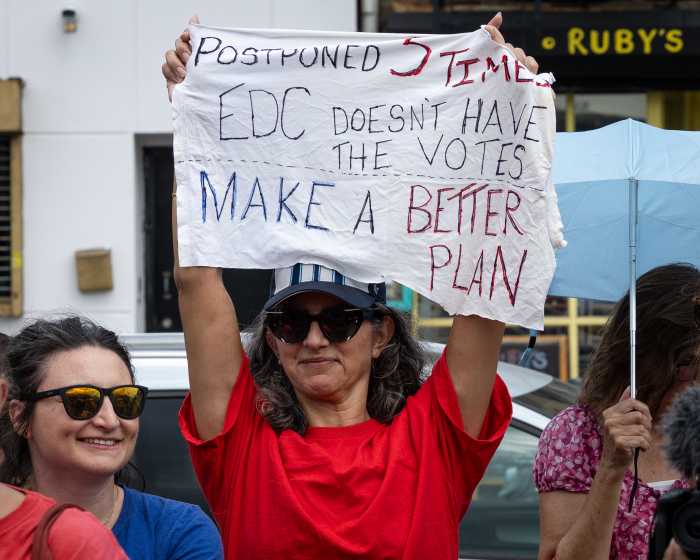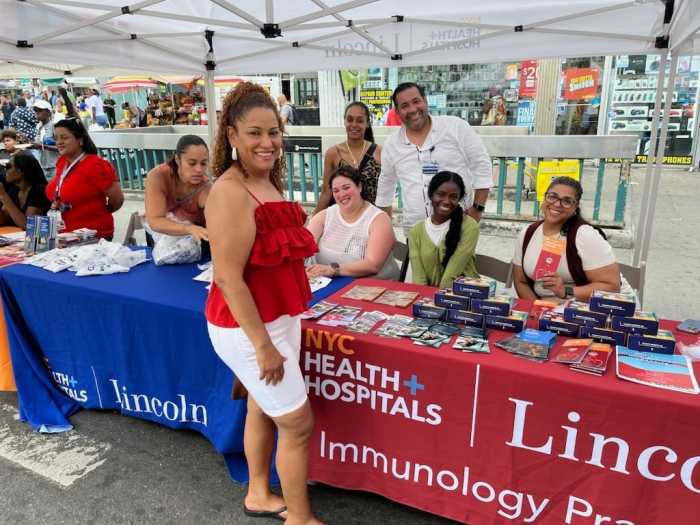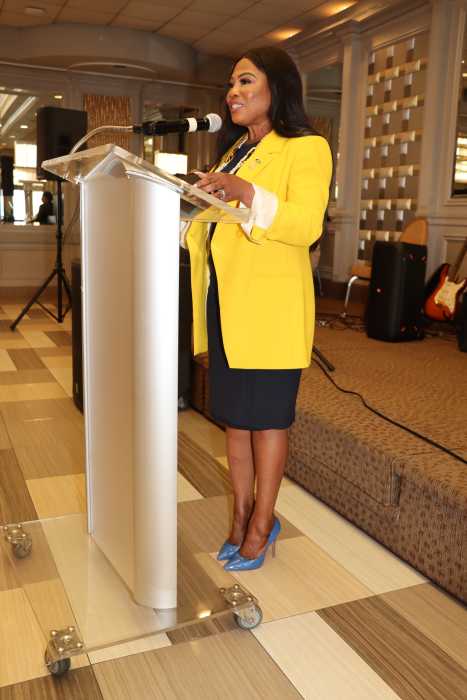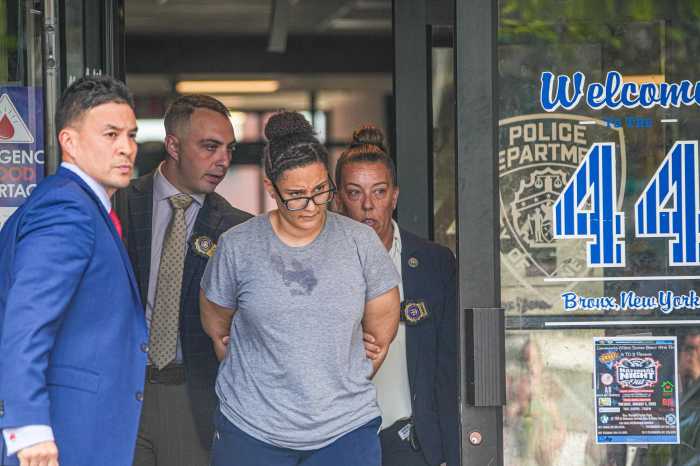Volume 5, Number 12 | March 23 – 28, 2006
BREAKING NEWS
POLITICS
BREAKING NEWS
UPDATED 7 p.m. FRIDAY, March 24, 2006
Bloomberg Pushes, Pride Agenda Pushes Back, and a Meeting Takes Place As Well
Amidst political jockeying by mayor, state gay rights lobby, marriage summit participants voice hope
Fulfilling a commitment he first made in an interview with Gay City News this past December, Mayor Michael R. Bloomberg convened a breakfast for gay and lesbian leaders this morning, March 24, at Gracie Mansion to discuss how he can contribute to the community’s efforts to win same-sex marriage rights in New York State.
Public statements from the LGBT attendees, who numbered more than a dozen, reflected several common themes-an acknowledgment that the mayor appeared committed to lending his political capital to moving both the public debate and the legislative prospects for a gay marriage bill forward in Albany, optimism that the meeting indicated an unusual degree of comity between Republican Bloomberg and Democrat Christine Quinn, the lesbian speaker of the City Council, and recognition that today’s gathering was just the first step in a process that could span years.
The apparent success of this initial meeting on gay marriage between the mayor and gay advocates–which ran to two hours–stands in stark contrast to the buzz in gay circles in the 24 hours leading up to the breakfast. Throughout the day Thursday and into the evening, many in the community, among both those invited and others, engaged in heated discussion about what proved to be a stark absence from the meeting-representation from the Empire State Pride Agenda, the state’s LGBT political lobbying organization. The Pride Agenda has played the lead role in enacting gay rights legislation in Albany for more than a decade-its most significant triumphs coming with the 2002 enactment of the Sexual Orientation Non-Discrimination Act and the 2000 hate crimes statute.
The Bloomberg administration first confirmed that the meeting was taking place early Thursday evening, indicating that the subject was marriage equality-what strategy gay leaders have on the issue and “what the city can do to assist in that effort”-and that the Pride Agenda had been invited.
In a telephone interview late Thursday evening, City Council Speaker Christine Quinn told Gay City News that she had first been invited to the breakfast early this week. She could not recall whether the mayor’s office had asked for suggestions of people who should attend, but said that she had her staff pull together a list of names, which included the Pride Agenda.
“We were told that the Pride Agenda was invited,” Quinn said.
But the devil in this matter was clearly in the details. In fact, the Pride Agenda was faced with an ultimatum from the Bloomberg team-the group was welcome to send board members, but its executive director, Alan Van Capelle, would not be invited.
At working meetings of this type, board members typically would not attend in place of an executive director or senior staff member, and the Pride Agenda rejected the offer to send representatives from its board. The group withheld comment Thursday evening when contacted, but struck back hard at Bloomberg Friday morning.
“Throughout this city, tens of thousands of gay and lesbian couples live with daily uncertainty because they are not afforded the rights and responsibilities that come with a marriage license. They look to the mayor and the Empire State Pride Agenda to work together to make their lives better,” Van Capelle said in a written statement. “The Bloomberg administration may have tried to punish the Pride Agenda this morning by excluding us from Gracie Mansion, but in the end all they did was let down the tens of thousands of gay families that expect leadership-not politics-on this issue and, who frankly, expected more from their mayor than this.”
The mayor’s office first publicly raised the prospect of such a meeting in an interview Bloomberg gave Gay City News on December 12 of last year. On that occasion, the mayor was explaining what many in the gay community view as the contradiction between his appeal of a favorable gay marriage ruling that came down from a Manhattan trial court last February and his stated support for a same-sex marriage law in New York. Stating that his corporation counsel had an obligation to challenge the pro-gay ruling in order to test whether it would be affirmed by the state’s highest court and become permanent, he went so far as to say, “My hope is that the court will say that it is legal under the Constitution.”
During the interview, after extended discussion of the issues involved, Anthony Crowell, who serves as special counsel in Bloomberg’s office, jumped in to say that Bloomberg had directed him to convene “a legislative meeting among all the LGBT groups in the city in January where we’re going to discuss a variety of issues, identify our common goals, and pursue them accordingly.”
If in fact today’s breakfast was intended as a legislative meeting, many in the community contacted Thursday evening, including some who attended, questioned how serious progress could be achieved in the absence of the community’s surrogate in Albany. Some speculated that the snub of Van Capelle was intended as payback for the Pride Agenda’s endorsement of Democrat Fernando Ferrer in last year’s mayoral election. But others told Gay City News that there was a deeper issue of trust dividing the mayor and Van Capelle, one that may have been created by the Bloomberg team’s sense that the Pride Agenda had dangled the prospect of an endorsement last year when in fact that was never in the cards.
Quinn indicated that her office learned only late on Thursday that there was controversy over the Pride Agenda’s role in the meeting. A former executive director of the New York City Gay and Lesbian Anti-Violence Project, the speaker was asked how she would have responded had a mayor informed her that she could not attend a meeting but that her board members were welcome. She said, “It would depend on the circumstances of who was being invited from other organizations.” She added, however, “I can certainly understand the concerns this would raise for the Pride Agenda.”
Quinn emphasized that Bloomberg’s interest in convening the meeting is a positive.
“I can’t imagine he would pull this meeting together if he were not willing to step forward more,” she said of the mayor’s role as a same-sex marriage advocate. “He is in a unique position in Albany, being a Republican and having just been reelected. Hopefully, this is his first salvo in his becoming more public and active in this.”
Several of the attendees who spoke to Gay City News in the wake of the gathering echoed the optimism in Quinn’s statement.
“What we were told by the mayor and the speaker was this was an opportunity to share ideas, hear from us, and formulate a plan,” said Matt Foreman, executive director of the National Gay and Lesbian Task Force, and the former head of both the Pride Agenda and the Anti-Violence Project. “This was not a meeting where the strategy was handed down to us from on high. The mayor said it repeatedly that he wanted to work on this and I think it is significant that he asked the speaker to work with him.”
Foreman’s comments were significant given the speculation by a number of people Thursday evening that he would boycott the meeting to protest the exclusion of his Pride Agenda successor. Foreman told Gay City News today that he had considered doing just that, but explained that the mayor’s office made clear to him that he had been invited not in his role as head of the Task Force, but rather due to his position on the city’s Human Rights Commission, to which Bloomberg appointed him.
In fact, Foreman as a mayoral appointee has a complex relationship with Bloomberg. In 2004, he resigned from the Commission to protest the mayor’s veto of the Equal Benefits Bill, a measure that would have required contractors doing business with the city to offer the domestic partners of their employees the same benefits given to spouses of workers. Faced with an override of his veto, Bloomberg successfully challenged the law in state court. Foreman, however, rejoined the Commission last summer when Bloomberg prevailed on a number of insurance providers to make available domestic partnership policies to companies with fewer than 50 employees. Such policies had not previously been commercially available, and the Task Force head lauded the mayor for his efforts.
In explaining how his role on the Human Rights Commission played into his decision, Foreman said, “I can see ways that the Commission can weigh in on this discussion.”
Another Human Rights Commission member, Jonathan Capehart, a former journalist who worked for Bloomberg’s media company and advised the mayor in both his election campaigns, was more emphatic in declaring the meeting a success.
“Anytime the Mayor proactively calls on the community for help in devising a strategy to achieve its goals is a good thing,” Capehart wrote in an e-mail message. “That Bloomberg and City Council Speaker Chris Quinn convened the first of many meetings to focus specifically on ways the administration can work with the community to secure marriage rights… Because they sat side-by-side at this extraordinary meeting, I am very encouraged by what can be accomplished.”
Richard Burns, as the executive director of the LGBT Community Center since the 1980s, is both one of the community’s longest-serving leaders and the head of an institution that has received significant city budget support-for operating and capital costs-in recent years. He voiced the view that the Bloomberg breakfast was a sign of progress.
“I thought the meeting was a good first step,” he told Gay City News. “I was impressed that the mayor called for this meeting and engaged Speaker Quinn in convening it together to work with our community to ensure that we would have a focused, vigorous campaign with the state Legislature and the people of New York to achieve marriage equality.”
Christopher Taylor, president of the New York City chapter of the Log Cabin Republicans, not surprisingly gave the mayor good marks as well.
“It was a good meeting,” he said. “He was way more aggressive than I thought he would be in terms of stuff that he’s willing to do to promote gay marriage in Albany.”
Then, in a clear reference to Van Capelle’s absence, he Taylor added, “No organization was excluded.”
That line matched the message from Stu Loeser, the mayor’s press secretary. Asked about Van Capelle’s exclusion from the meeting, he said, “We were careful and attempted to invite a couple of people from the Pride Agenda. We put out calls and some were not returned.” Pressed further on why Van Capelle was not invited, he said, “We are not commenting on that.”
Neither Burns nor Foreman was buying the explanation that a board member invitation was the equivalent of one extended to the head of an organization. Both said they raised their concerns with “mayoral staff,” but it is clear that the topic of the Pride Agenda did not rise to the level of a major issue in the meeting.
Among others in attendance were Andres Duque, a senior staff member at the Latino Commission on AIDS and the head of Mano a Mano, an umbrella group made of up of Latino LGBT organizations, and Gary English, executive director of the People of Color in Crisis, an HIV prevention group in Brooklyn. Neither could be reached for comment.
Everyone who was reached, Loeser included, acknowledged that today’s gathering was the first of what they hoped were many, and nobody was talking about anything close to a clear road map. Burns voiced the hope that if the ruling from the Court of Appeals, the state’s highest, on several pending marriage lawsuits, expected as early as this summer, proves favorable “the city will say, ‘We don’t need six months, we’re ready now.’”
Loeser predicted that the next steps will be take shape in what he termed Bloomberg’s customary style-“He pursues legislation with dual strategies and the public lobbying is not the only part… People can critique this mayor for not grandstanding, but there is a lot of work he does in private as well.”
Some not in attendance were not shy about criticizing the meeting. Allen Roskoff, president of the Jim Owles Liberal Democratic Club, a gay political club, told Gay City News, “The people who went to this meeting allowed Mayor Bloomberg to divide our community. The moment that Alan Van Capelle was not invited, people should not have attended. They should be ashamed of themselves for attending.”
Quinn could not be reached for comment on Friday afternoon. The previous evening, she told Gay City News that she is planning an April meeting of LGBT leaders to follow up on a March 16 gathering that Senator Hillary Rodham Clinton convened in Washington of the Democratic Senate Steering and Outreach Committee that included New York LGBT leaders, the speaker and Van Capelle among them. Quinn said that the Clinton meeting focused on the effort to defeat a June congressional vote on the federal marriage amendment that President George W. Bush is pushing to enshrine marriage inequality in the Constitution. That group also talked about pushing back with a hate crimes law and an employment non-discrimination effort to call the Republicans’ bluff on their assertion that it is only marriage they are concerned about keeping a heterosexual institution.
“It’s sort of like, ‘You’re not even willing to do that?’” Quinn said of the emerging Democratic approach.
The speaker said the April meeting in New York would provide a chance to add grassroots activists to the mix of organizational leaders who attended the gathering in Washington.
How Quinn’s meeting in April will dovetail with her new effort with Bloomberg remains unclear. And how the administration and the Pride Agenda will pull back from the brink-if in fact both sides wish to do so-will also be a fascinating story to follow.
Services
gaycitynews.com





























